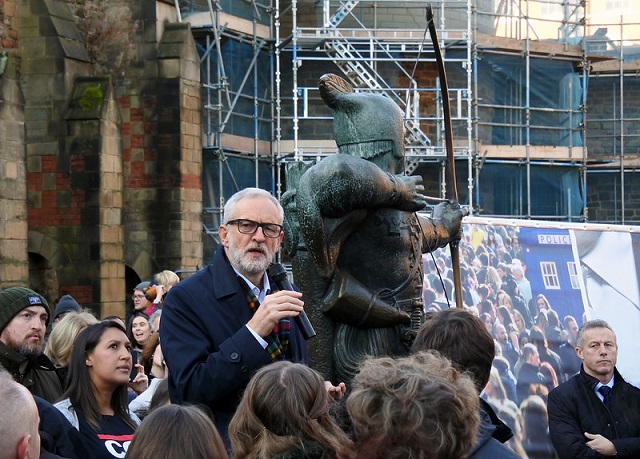After Corbyn: The British Left must reflect, learn and fight again Analysis
Ideas, New in Ceasefire - Posted on Thursday, December 19, 2019 15:33 - 0 Comments

Jeremy Corbyn speaking alongside the Robin Hood statue at a rally in Nottingham, 4 December 2019. (Source: Flickr/Creative Commons)
Earlier this year, I published a book describing the rejection that befell the so-called ‘political centre-ground’ on both sides of the Atlantic in 2016. Most of it still stands up, I guess. My claim was that the exponents of that style of politics – an undemocratic deference to the Finance sector in economics, tempered by a selective social liberalism – had failed to interrogate why it was so dramatically rejected.
The ‘Stop Brexit’ brigade (many of them discovering their enthusiasm for the EU the morning after the referendum) and the Clintonite ‘resistance’ against Trump ignored questions about what their form of liberalism was actually supposed to offer those struggling through the recession. They preferred instead to pin all blame on ‘external’ agents – fake news, Russian interference, manipulation of Facebook’s algorithms – as if, without such machinations, nobody would have dreamed of striking out against their ideology. Even if every story about Putin and Cambridge Analytica were true, I suggested, centrism’s new conspiratorial imaginary was politically useless. For who would ever admit to themselves that they voted the way they did because they were tricked by a Facebook post?
Centrism failed to stop right-wing populism in 2016 and, after getting a couple of cracks at the whip, the first (ludicrously tantalisingly) successful radical left party in Britain has failed too. The Labour centrists we bamboozled to get control of the party are unsurprisingly angry with us, and we on the left are very angry with them. They think we’ve driven the party over a cliff edge in a fit of blinkered ideological zeal. We think that instead of trying to win over anyone within the party or outside it, they have spent four years WhatsApp-ing journalists in order to render illegitimate a good man and the hundreds of thousands of party members who gave him his mandate (and, lest we forget, did the door-knocking that kept them in their seats with increased majorities… until it didn’t).
Maybe part of the anger on both sides is a creeping feeling that we’re no longer so different. Various shades of UK centrism fucked it in the 2015 general election in the Labour leadership contest against Corbyn, and in the EU referendum. We’ve fucked it now. And in the last case against the same people: Johnson, Cummings, Farage (good God!). Actually, centrism has fucked it again, too. Because since 2017, the only anti-left leverage Labour centrists had was that the members wanted to stay in the EU more than the leader did. And now Britain’s membership of the EU, like this particular left leader, is going to disappear. Political hubris is fine, because it’s only hubris if it doesn’t work, and it always doesn’t work for one side. But it’s not very nice to feel one has been hubristic, and now we get to feel it too.
Unlike the centrists, it should be said, everyone still agrees that our side actually has good ideas. In fact, third on all the lists of what went wrong for Corbyn’s Labour this time is the claim that the manifesto, It’s Time For Real Change, had too many ideas in it; which is like something you make up in a job interview when they ask what your weaknesses are. So, if at least it isn’t crazy to say that ideology wasn’t our problem, we start looking around for the external agents that will explain our defeat. But I wrote a book about how that wasn’t good enough when the centrists did it, so what now?
The 2016 campaigns for Remain and Hillary Clinton were right when they protested that they were disadvantaged by false claims made by their far-right antagonists. But they were wrong to think that their electorates were therefore straightforwardly ‘tricked’ by the lies. The problem was that their whole theory of ‘belief’ was one-dimensional, imagining political audiences as brain-dead receptacles waiting to be filled with whatever nonsense the Facebook algorithm throws their way. They missed that belief is very often about desire. And that people are more than happy to believe something unlikely if it fits with what they want to be true anyway. When you are already convinced Clinton is a corrupt, acquisitive warmonger, why not throw the idea she’s part of a paedophile ring and is terminally ill into the mix for good measure?
These centrist campaigns objected morally to their rivals’ obscene and racist remarks, and – in Trump’s case – to his own boasting about perpetrating sexual violence. But once again, this meant overlooking that it is part of the weirdness of desire that those of us who don’t get to do whatever we want can sometimes feel well-disposed towards someone who seemingly does.
Britain’s right-wing print media savaged Corbyn with the same zeal and disregard for truth with which they have pursued Brexit; but unlike the Remain campaign, Corbyn also faced relentless hostility from liberal papers and broadcasters that – there being more narcissism at stake – seemed to regard him as even more uniquely illegitimate than the right did. Boris Johnson has done what he always has, and lied continuously, while 88% of his most promoted Facebook ads during the election contained false information.
On top of this, BBC journalists spent the campaign repeating briefings from this most mendacious of Tory leaderships as fact, while making near-constant presentational and editorial ‘errors’ in Johnson’s favour. Supporters of the centrist Liberal Democrats played their part too, in a swathe of websites advising tactical votes to unseat Tory MPs, which routinely recommended voting Lib Dem in ludicrous places, even against sitting Labour MPs.
The left must redouble efforts to develop new forms of media to make its case heard on increasingly hostile terrain. But it should not make the mistake I accused centrism of making, of missing that people are not merely tricked by false narratives, but often willingly welcome them with open arms. For instance, the YouGov-reported public view that Corbyn is personally as racist as Johnson shouldn’t survive serious thought, whatever the inadequacies of Labour’s management of antisemitism cases. So, if the coverage of this issue was often misleading and overstated, have people therefore been tricked and manipulated?
Perhaps more important is the possibility that there are people for whom the selflessness with which Corbyn has pursued his famously omnivorous social justice causes makes it intensely appealing to think that, in fact, it could all conceal a way in which he’s as bigoted as the rest of us? If one’s view of the left is that they are all censorious woke-scolds, just waiting to accuse one of racism, then of course it is an alluring thought that it should turn out that it is they who are the true racists.
Or, to take a second example, after Johnson was confronted with an image of a sick child asleep on a pile of coats in a hospital, social media erupted with claims – helped along by certain broadsheet journalists – that the photo had been staged, even after the hospital itself confirmed its authenticity. We can only understand the eagerness with which the fake story was taken up if we understand that there are people who want to believe that reports about austerity are false, that no one is suffering as much as all that, and rather it has all been confected by the spoiled and workshy.
The wager of Corbynism was that the radical left could overcome the radical right where centrism couldn’t, because having a big material offer and anti-establishment energies of its own, it would be less vulnerable to being wrongfooted in the manner of its centrist rivals. In my book I celebrate it as the sort of libidinal politics that could create a genuine mass movement, of a kind that the anaemic centre could only dream of.
This all held true in the 2017 election and it could do so again, but as Brexit became a more polarising issue and the willingness of our coalition of Leavers and Remainers to compromise splintered, Labour made the error of being seen to side with the latter. It might be true that retaining a soft Leave position would have cost Labour its Remain voters, with a similar outcome. But even taking that on trust, I share the view of Paul O’Connoll and others that – all else being equal – it was a historic mistake for a socialist party to prioritise the anti-democratic demand of mainly middle-class Remainers over the democratic demand of mainly working-class Leavers.
 This is no longer the contention. Brexit will happen, and our new leader should not be someone who was seen to try and avert it. But getting Brexit out of the way will not be a panacea for victory next time, any more than impeaching Trump would be for the US’s centrist Democrat establishment. Centrists didn’t trouble to wonder why – as I put it in the book, borrowing from Kafka – ‘someone must have been telling lies about Hillary Clinton…’, or why people should want to believe even the most outlandish of claims against them. As it prepares to fight again, the Labour left should not make the same error.
This is no longer the contention. Brexit will happen, and our new leader should not be someone who was seen to try and avert it. But getting Brexit out of the way will not be a panacea for victory next time, any more than impeaching Trump would be for the US’s centrist Democrat establishment. Centrists didn’t trouble to wonder why – as I put it in the book, borrowing from Kafka – ‘someone must have been telling lies about Hillary Clinton…’, or why people should want to believe even the most outlandish of claims against them. As it prepares to fight again, the Labour left should not make the same error.



Leave a Reply